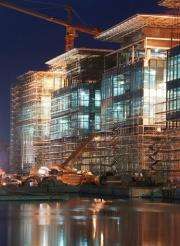Saudi aims for moon with new hi-tech research oasis

Saudi Arabia was on Wednesday to launch a new hi-tech mixed-sex university on the Red Sea coast aimed at catapulting the kingdom into the forefront of global technological research.
Jammed with equipment most scientists can only dream of and sporting one of the world's fastest supercomputers, King Abdullah University for Science and Technology (KAUST) was to be officially unveiled late afternoon by King Abdullah with an audience of top world scientists and a handful of leaders.
KAUST with its flashy three-dimensional imaging facilities and other modern hardware worth some 1.5 billion dollars, is a keystone of the 85-year-old king's effort to modernise the oil-rich kingdom, underscored by its launch on the Saudi national day.
While Saudi officials are loathe to talk about it, the post-graduate-level-only university is also the first Saudi public education institution to mix men and women, challenging hardline Islamic clerics' rule on keeping the sexes separated.
Built in just two years out of the barren desert coast 80 kilometres (50 miles) north of Jeddah at a cost of billions of dollars, KAUST has recruited an international faculty and student body.
Experts say that it's probably the first research university in the world ever built from the ground up.
But no one is certain whether the huge leap into global-class research, with the best equipment, talent and research projects money can buy, can revolutionise the country's backward and often heavily religion-focused education sector.
"Our research facilities are unsurpassed," says KAUST president Choon Fong Shih, who helped build the national university in Singapore into a respected research institution.
"I stood here two years ago, there was nothing but sand and sea. Today, there is one of the best infrastructures for research," he told AFP.
"Hopefully, it will act as a catalyst in transforming Saudi Arabia into a knowledge economy," Vice-President Nadhmi al-Nasr told Saudi daily Arab News.
The masters and doctorate degree students represent more than 60 countries, with some 15 percent from Saudi Arabia itself.
With about 15 percent of the incoming student body women, all having studied at universities outside the kingdom, mixing is absolutely necessary for successful research, experts say.
Organisers said among those expected to attend the ceremony are Turkish President Abdullah Gul, Malaysian King Tuanku Mizan Zainal Abidin, Sudanese President Omar al-Beshir, Philippines President Gloria Macapagal-Arroyo Mauritanian President Mohamed Ould Abdul Aziz and Claude Gueant, a top aide to French President Nicolas Sarkozy.
Security was high for the opening ceremony after Al-Qaeda's Yemen branch issued a new threat against Saudi Arabia on Tuesday, nearly four weeks after a suicide bomber blew himself up in an attempt to kill Deputy Interior Minister Prince Mohammed bin Nayef.
KAUST's chairman is Oil Minister Ali al-Naimi, who is an influential figure in OPEC representing what was until recently the world's top oil exporter but which now stands second to Russia.
(c) 2009 AFP

















